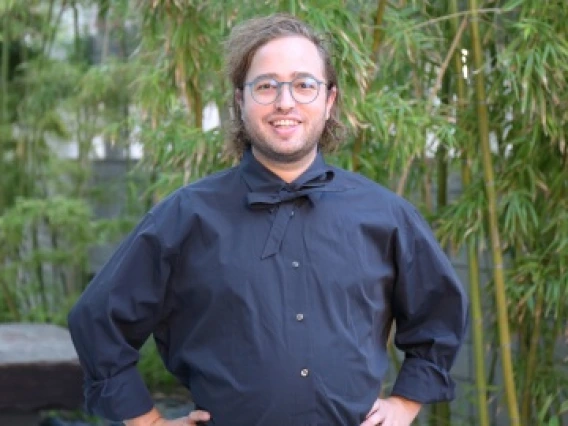
Dr. Harris Kornstein, Assistant Professor in the Department of Public and Applied Humanities, has been awarded a University of Arizona Early Career Scholar Award.
Sponsored and announced by the Office of the Provost, the award “recognizes outstanding early career faculty who are at the forefront of their disciplines and make highly valued contributions to the teaching, creative activity, and service priorities set out in the University's Strategic Plan Five Pillars.” Recipients receive $5,000 in University funds to facilitate further work within their discipline.
“Dr. Harris Kornstein is already a distinguished scholar and embodies the spirit of public enrichment and inclusive excellence that define UArizona’s mission and Strategic Plan. Given their impact across several disciplines and on many contemporary challenges—especially related to technology, culture, and education—their work has, and will continue, to address grand challenges, impact local and international communities, and improve near and long-term student success,” according to a nomination letter written by colleagues in the Department of Public and Applied Humanities, joined by professors from the LGBTQ+ Institute, Department of Gender & Women’s Studies, School of Art, and outside scholars.
Since joining the department in 2021, Kornstein “has demonstrated outsized public impact through research, art practice, teaching and service,” including receiving a fellowship from the National Endowment for the Humanities and securing more than $100,000 in grants, the nominators wrote.
“Kornstein’s community-engaged and interdisciplinary work has been celebrated in the academy, popular media, and non-profit and government sectors, shaping global debates about culture and creating educational spaces where people of all ages and backgrounds can express their identities and ideas freely and safely,” the nominators wrote.
“Dr. Kornstein’s research, teaching, and outreach focus on what they term queer play, and consider how historically-marginalized communities can imaginatively challenge social norms—especially relating to digital technologies, media activism, and creative pedagogies—in order to create a more just and joyful society. This spirit embodies and enhances the university’s mission of public inquiry and service, offering a unique approach to solving entrenched social challenges through projects that foreground curiosity, creativity, and care.”
“That Harris’ work is widely-read, interdisciplinary, spans forms/genres, and moves throughout academic and public spheres is impressive on its own account. However, when one takes into account the intense anti-queer climate both in the state of Arizona and across the United States, Harris’ work takes on additional importance and significance. That is, Harris’ work is not only resistant to anti-queer attacks, but also, due to its highly-read and cited nature, provides an important reminder or queer livingness for queer and trans youth and their families of support,” wrote another nominator, Z Nicolazzo, Associate Professor in the Department of Educational Policy Studies and Practice.
The Early Career Scholars award is the latest in a string of honors Kornstein has earned, including the College of Humanities Chatfield Impact Award—honoring work that celebrates new voices, fights systemic bias, connects the University to the community, and measurably improves the world—as well as grants from the University’s Office of Research, Innovation and Impact, and a Digital Humanities Seed Grant from the NYU Center for the Humanities
“Dr. Kornstein demonstrates an unusual capacity to carry out highly impactful, long-term, and collaborative scholarly projects—often inextricably and complexly interwoven with community engagement work,” wrote Ken McAllister, Associate Dean of Research and Program Innovation. “Kornstein also has a finely trained capacity for cross-disciplinary collaboration, particularly where questions about the good of the community are concerned, and is a fierce champion for matters related to justice, equity, diversity and inclusion.”

